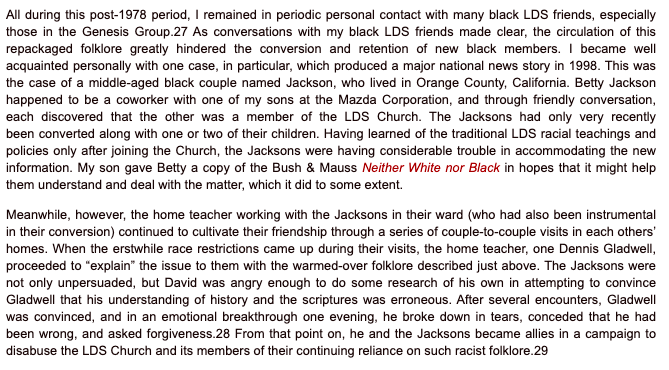Armand L. Mauss provides background leading to ban repudiation campaign.
- Type
- Website
- Source
- Armand L. Mauss LDS
- Hearsay
- DirectLate
- Reference
Armand Mauss, "An Abortive Campaign Against the Folklore (Mauss)," Juvenile Instructor Blog Post, February 21, 2013, accessed June 28, 2021
- Scribe/Publisher
- Juvenile Instructor (blog)
- People
- Armand L. Mauss, Dennis Gladwell, David Jackson, Betty Jackson
- Audience
- Reading Public
- Transcription
All during this post-1978 period, I remained in periodic personal contact with many black LDS friends, especially those in the Genesis Group. As conversations with my black LDS friends made clear, the circulation of this repackaged folklore greatly hindered the conversion and retention of new black members. I became well acquainted personally with one case, in particular, which produced a major national news story in 1998. This was the case of a middle-aged black couple named Jackson, who lived in Orange County, California. Betty Jackson happened to be a coworker with one of my sons at the Mazda Corporation, and through friendly conversation, each discovered that the other was a member of the LDS Church. The Jacksons had only very recently been converted along with one or two of their children. Having learned of the traditional LDS racial teachings and policies only after joining the Church, the Jacksons were having considerable trouble in accommodating the new information. My son gave Betty a copy of the Bush & Mauss Neither White nor Black in hopes that it might help them understand and deal with the matter, which it did to some extent.
Meanwhile, however, the home teacher working with the Jacksons in their ward (who had also been instrumental in their conversion) continued to cultivate their friendship through a series of couple-to-couple visits in each others’ homes. When the erstwhile race restrictions came up during their visits, the home teacher, one Dennis Gladwell, proceeded to “explain” the issue to them with the warmed-over folklore described just above. The Jacksons were not only unpersuaded, but David was angry enough to do some research of his own in attempting to convince Gladwell that his understanding of history and the scriptures was erroneous. After several encounters, Gladwell was convinced, and in an emotional breakthrough one evening, he broke down in tears, conceded that he had been wrong, and asked forgiveness. From that point on, he and the Jacksons became allies in a campaign to disabuse the LDS Church and its members of their continuing reliance on such racist folklore.
The B. H. Roberts Foundation is not owned by, operated by, or affiliated with the Church of Jesus Christ of Latter-day Saints.

